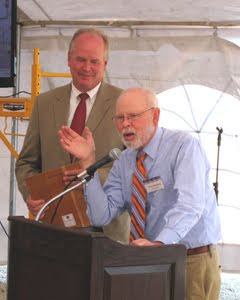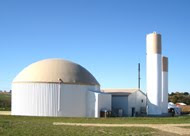by jboullion | Apr 5, 2011 | Uncategorized
From a news release issued by the Organic Farming Research Foundation:
Organic farmers from across the U.S. will join the Organic Farming Research Foundation’s(OFRF) new executive director Maureen Wilmot for the Organic Trade Association’s(OTA’s) Policy Conference and Hill Visit Days in Washington, DC April 6-7, 2011.
Five entrepreneurial organic farmers will journey from Georgia, Maine, New York, Oklahoma, and Wisconsin to discuss the beneficial impacts of their farm businesses on rural economies and on environmental and public health with their congressional members who sit on key agriculture and appropriations committees and subcommittees. OFRF is a supporting organization of the OTA event and Ms. Wilmot will be a speaker at the conference.
“This event is a wonderful opportunity for members of Congress to learn from the farmers themselves about the role of organic farmers who really are the “roots” of the burgeoning 26 billion dollar organic industry,” said Ms. Wilmot.
Ms. Wilmot, OFRF staff, and the organic farmers will join with other OTA member companies to visit key members of Congress to discuss the economic and social viability of organic farming. The organization seeks to make organic farming viable, profitable, and attractive for the American farmers of today and those of the future.
“Organic farmers are the heart of the organic movement – without their commitment to vibrant communities and healthy ecosystems, the organic industry as we know it today could not exist,” said Ms. Wilmot. “In addition,” she noted, “Organic farmers contribute to a diverse U.S. agriculture. Investing in their future will benefit both consumers and rural communities nationwide.”
OFRF’s grant making program has worked closely with organic farmers for almost 20 years, awarding more than $2.5 million for over 300 organic research projects nationwide since 1992.
The five organic farmers OFRF is bringing to the OTA event are:
1. Mark Shepard is the CEO of Forest Agriculture Enterprises and the owner and manager of New Forest Farms in Viola, WI. New Forest Farms is a 104 acre perennial agricultural farm and forest considered by many to be one of the most ambitious sustainable agricultural projects in the U.S. Mark and his family grow organic fruits, vegetables, and tree nuts.
2. Will Harris and his family own and operate White Oak Pastures, an organic, grass-fed beef cattle farm in Bluffton, GA, which received the Governor’s Award for Environmental Stewardship in 2009 and 2011. Will is the President of Georgia Organics’ Board of Directors and is the Beef Director of the American Grassfed Association.
3. Michael Kilpatrick is the owner of Kilpatrick Family Farm which grows vegetables and raises chickens using organic practices on over 100 acres near Granville, NY. The farm sells to four farmers markets per week, employs 6 people full-time, and grows produce year-round in high tunnels.
4. Kathy Moore owns Anichini-Moore Ranch and Farm in Woodward, OK. The ranch “The Ranch” focuses on education and soil building, and produces rare breed sheep, wool, grass-pastured lamb, large Black Pig products, Belted Galloway beef, Bison, produce, flowers, nuts and fruit. Kathy is the co-founder of the Oklahoma Composting Council and received the Oklahoma State University Green Award for Sustainability in March 2011.
5. Sarah Smith and her husband own Grassland Farm in Skowhegan, Maine, a certified organic farm and dairy. She and her family milk 45 diverse dairy cows and produce organic, grass-fed beef and chickens as well as a wide range of vegetables. Sarah will be joining the conference on behalf of Organic Valley, the Wisconsin-based organic dairy marketing cooperative, which works closely with OFRF to promote organic agriculture.
by jboullion | Apr 1, 2011 | Uncategorized
From an article by Ron Seely in the Wisconsin State Journal:
WAUNAKEE – Sure, the cows on the farm run by Chuck Ripp and his brothers near here generate a lot of manure — about 7 million gallons a year.
But now they also generate electricity.
Call it cow power.
Thursday, Dane County officials were joined by farmers and utility officials and others to flip a ceremonial switch and power up the state’s first cooperative manure digester. Spearheaded by Dane County Executive Kathleen Falk, the $12 million project has been more than six years in the making.
When it is in full operation, the digester plant with its three huge tanks will process manure from three adjacent farms and a total of 2,500 cows. It will remove about 60 percent of weed-growing phosphorus from the manure. The digester will produce methane and that methane will be used to power generators that will churn out $2 million a year in electricity, enough to allow Alliant Energy to power 2,500 homes.
And, according to Dick Pieper, with Clear Horizons, the company that will run the plant, the entire operation can be run with an iPod.
“The efficiency of this plant is exceptional,” said Pieper. “It’s world class.”
Falk said the plant represents an important milestone in green energy production and in manure management in Wisconsin. Many digesters don’t remove phosphorus, which clogs lakes with weeds and toxic blue-green algae during warm months. But the Dane County plant was designed specifically to remove the nutrient.

by jboullion | Mar 29, 2011 | Uncategorized
RENEW is saddened by the death of former Representative Steve Hilgenberger, a solid and vocal supporter of renewable energy and other causes that exemplified his care for the people of his district and the State of Wisconsin. Representative. Hilgenberger was a major and tireless supporter of the 2009 Clean Energy Jobs Act.

Pictured above, Rep. Steve Hilgenberger, speaking at the dedication of the Montchevre-Betin digester, October 6, 2010 in Belmont, Wisconsin. On the left is Sen. Dale Schultz.
Rep. Hilgenberger exemplified the finest of pragmatic bipartisanship,
as well as gentle decency.
by jboullion | Mar 16, 2011 | Uncategorized
From a news release issued by Focus on Energy:
Completed proposals due April 30, 2011
MADISON, Wis. (March 11, 2011) – Today, Focus on Energy, Wisconsin utilities’ statewide program for energy efficiency and renewable energy, announced that businesses can compete for incentives for large renewable energy systems. The Large Renewable Energy System Competitive Incentives allow Wisconsin businesses and organizations to apply for funds to help implement large renewable energy systems.
Businesses can receive an incentive of up to 30 percent of the project costs to complete a renewable energy project that is well-researched, documented, and justified. Eligible, large-scale renewable energy systems may include: solar electric, solar hot-water, wind electric, biomass energy, and anaerobic digestion (biogas).
“Renewable energy technology offers businesses deeper energy cost savings after energy efficiency measures are implemented.” said Ken Williams, Focus on Energy’s business programs director. “Focus’ large renewable energy competitive incentives help businesses defray some of the upfront investment cost of a renewable energy system, resulting in a quicker payback.”
Any type of business, school, government entity, agribusiness, and apartments/condo facilities can apply for a Focus competitive incentive. The application and details are available online at focusonenergy.com/competitive_incentives. Applications are due by April 30, 2011.
by jboullion | Mar 2, 2011 | Uncategorized
From an article by Craig Reber in the Telegraph Herald, Dubuque:
Proponents of two proposed Grant County, Wis., wind farms wonder what’s next after Republican lawmakers suspended statewide wind farm siting rules Tuesday — the day they were set to take effect.
The Joint Committee for Review of Administration Rules voted 5-2, along party lines, to suspend the rules for 30 days.
The state Public Service Commission’s standards, which would have applied to projects less than 100 megawatts in generating capacity, would create uniform guidelines for where wind farms could be built. The committee’s vote means local regulations would remain in place.
The commission’s new rules would have allowed development of the proposed White Oak wind project by Wind Capital Group on parts of Smelser, Hazel Green and Paris townships, a project on hold for more than two years. Another wind project was planned for northern Grant County.
Ron Brisbois, director of Grant County Economic Development Corp., said Tuesday’s vote would “effectively deter wind farms throughout the state of Wisconsin.”
Republicans who took control of the Legislature in November said they were worried the Advertisement
rules would allow developers to build turbines too close to neighbors’ properties, driving down land values and increasing the risk of injury.
“I communicated with members of the committee, as well to our local representatives, (State) Senator (Dale) Schultz and (State Rep.) Travis Tranel,” Brisbois said. “My message to them was, if they do basically what (the committee) did, it will effectively kill my project. There is some hope moving forward is possible, but it’s highly unlikely.”
The committee must draft a bill supporting the suspension. It has drafted a measure that would require the commission to develop new rules within six months.
The vote disappointed John Beinborn, president of Grant County Economic Development Corp.


